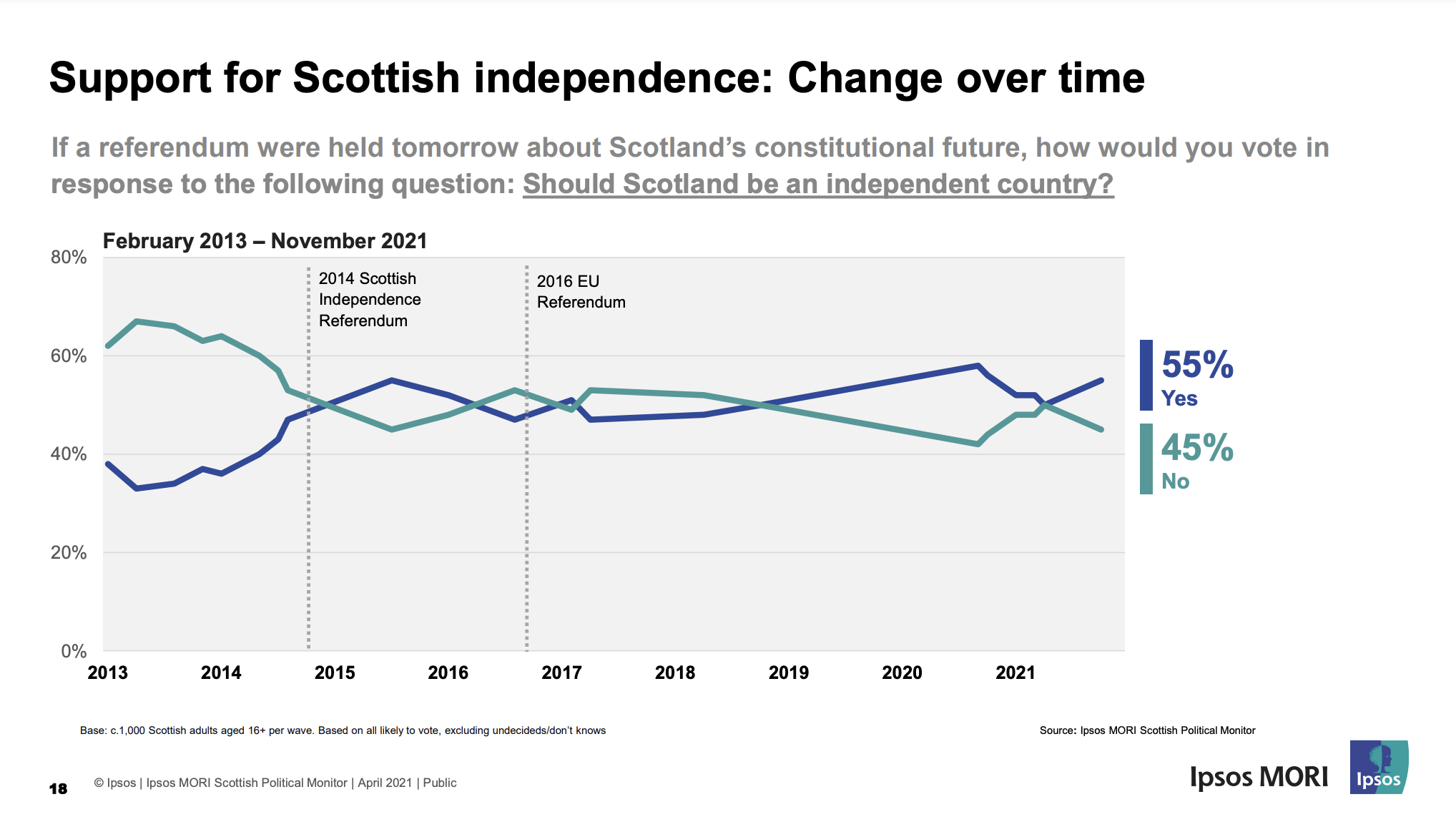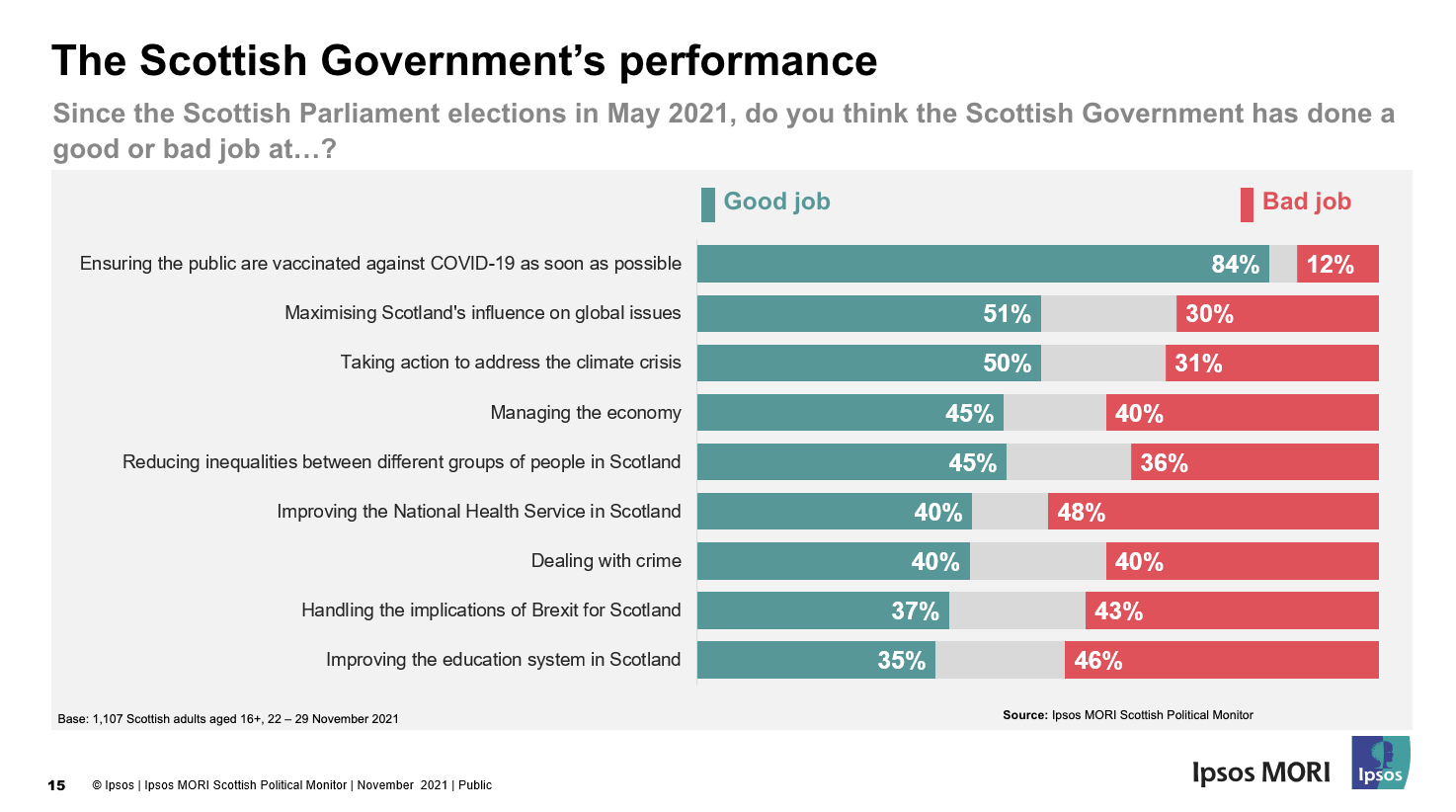Boris Johnson’s ratings hit a record low in Scotland as SNP support stays strong
Support for Scottish independence is 5 percentage points higher compared with our poll in early May, back to levels seen last November: 55% of those who would vote either Yes or No in an immediate referendum say they would vote Yes, while 45% say they would vote No.
Nicola Sturgeon is still the highest rated party leader, and Scots are overwhelmingly positive about the Scottish Government’s handling of the vaccine rollout. The public are not uncritical of the Scottish Government’s performance though – more think the Scottish Government has done a bad job of improving education and the NHS since the May elections than think it has done a good job.
Scottish Parliament voting intention
The SNP retains a strong lead in voting intention for both constituency and list votes. The Scottish Conservatives remain in second place on both votes, with Scottish Labour close behind. All polls are subject to a margin of error and the true value of support for any party is likely to lie within 4 percentage points of the estimate provided by this poll.
Headline Scottish Parliament voting intention figures for the constituency vote are:
- SNP: 52% (+2 compared with our last poll of 30 April – 3 May)
- Scottish Conservatives: 19% (-1)
- Scottish Labour: 17% (-5)
- Scottish Liberal Democrats: 5% (-1)
- Scottish Green Party: 3% (+1)
- Other: 3% (+2)
Headline Scottish Parliament voting intention figures for the regional vote are:
- SNP: 43% (+4 compared with 30 April – 3 May)
- Scottish Conservatives: 20% (-3)
- Scottish Labour: 15% (-3)
- Scottish Green Party: 12% (unchanged)
- Scottish Liberal Democrats: 6% (-2)
- The Alba Party: 1% (-1)
- Other: 3% (+1)
Scottish independence
- Support for independence is 5 percentage points higher than it was in early May, with Yes taking a lead. Among those likely to vote either Yes or No in an independence referendum, 55% say they would vote Yes while 45% would vote No.
- All age groups except the oldest – those aged 55+ - are more likely to say they would vote Yes than that they would vote No.

Top issues facing Scotland
- Key concerns for the Scottish public are healthcare/ the NHS (38% mention this as an important issue facing Scotland), Scottish independence/ devolution (27%), coronavirus/ pandemic disease (26%), and education and schools (26%).
Scottish Government performance
- Scots are overwhelmingly positive about the vaccine rollout – more than 4 in 5 (84%) say the Scottish Government has done a good job of ensuring the public are vaccinated against COVID-19 as soon as possible.
- In the wake of the COP26 summit, the Scottish Government is also seen to have performed well at maximising Scotland’s influence on global issues (51% think it has done a good job at this, while 30% say it has done a bad job) and at taking action to address the climate crisis (50% say it has done a good job at this, while 31% say it has done a bad job).
- However, the public feel the Scottish Government is doing less well at improving key public services. Almost half (48%) say it has done a bad job of improving the NHS in Scotland, while 40% say it has done a good job. When it comes to education, 46% say it has done a bad job at improving the education system, while 35% say it has done a good job.
- More feel that the Scottish Government has done a bad job at handling the implications of Brexit for Scotland (43%) than think it has done a good job (37%) - while 20% don’t know.

Satisfaction with party leaders
- First Minister Nicola Sturgeon remains the highest rated of the party leaders. Almost three in five (58%) say they are satisfied with the job she is doing as First Minister, while 38% are dissatisfied.
- Scottish Labour leader Anas Sarwar also fares well, with 45% of Scots satisfied with him. 28% are dissatisfied and a similar proportion (27%) don’t know enough to rate him.
- The least popular of the Scottish party leaders is Scottish Conservative leader Douglas Ross, with half (51%) of Scots saying they are dissatisfied with his performance as Conservative leader. 24% are satisfied, while 25% don’t know enough to rate him.
- Prime Minister Boris Johnson’s ratings are very low in Scotland. 4 in 5 Scots (80%) say they are dissatisfied with the way he is doing his job as Prime Minister, while just 16% are satisfied. This is the lowest level ever recorded by Ipsos – Johnson’s previous lowest rating was in October 2020, when 76% were dissatisfied with his performance as Prime Minister, while in April 2021 64% were dissatisfied. Almost 3 in 5 (58%) of those who voted Conservative at the 2019 General Election say they are dissatisfied.
- For further party leader ratings, please visit Ipsos’s website: www.ipsos-mori.com
Emily Gray, Managing Director of Ipsos Scotland, commented:
This latest poll from Ipsos and STV News indicates that the argument for Scottish independence is far from over, with a slight improvement for the Yes side. Given the margins of error around polling estimates, however, neither the Yes or No camps should be confident of victory at this point. The Yes camp may be benefiting from what has been a very bad week for Boris Johnson and the Conservatives at Westminster, with fieldwork taking place after heated debate about MPs’ second jobs. This is certainly reflected in Johnson’s own ratings, which have fallen to a new low.
Notes:
- Ipsos interviewed a representative sample of 1,107 adults aged 16+ across Scotland.
- Interviews were conducted by telephone 22 – 29 November 2021.
- Data are weighted to the profile of the population.
- Where results do not sum to 100%, this may be due to computer rounding, multiple responses, or the exclusion of “don’t know” categories.
- All polls are subject to a wide range of potential sources of error. On the basis of the historical record of the polls at recent general elections, there is a 9 in 10 chance that the true value of a party’s support lies within 4 points of the estimates provided by this poll, and a 2 in 3 chance that they lie within 2 points.



